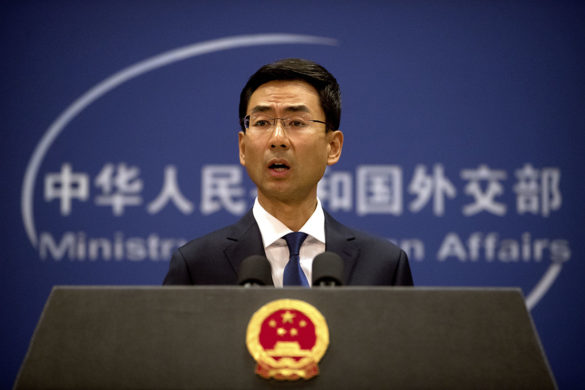
China hawks wary of Trump’s ‘massive’ deal
President Donald Trump has touted a preliminary agreement with China as a “massive” deal, but even some of his staunchest supporters aren’t hiding their skepticism.
“You shouldn’t be thrilled,” said Michael Pillsbury, a senior fellow at the Hudson Institute and outside adviser to Trump. “The tactic here is to postpone the harder issues until phase two, but phase one isn’t even locked up yet and it could explode in our faces.”
Pillsbury was responding to a skeptical Lou Dobbs, a Fox Business host who routinely provides Trump affirmation on his trade strategy.
“This is an insult to the president. It’s an insult to the United States, and I don’t really give a damn about a single investment banker in this country having open access to China,” Dobbs said in an exchange with Pillsbury on his program Tuesday night.
The harsh criticism came on the heels of last week’s announcement of a so-called phase one deal in which China agreed to ramp up its purchases of U.S. agricultural products by as much as $50 billion annually, further open its market to U.S. financial services firms and increase some intellectual property protections.
The U.S. suspended a tariff increase scheduled to take place Tuesday, and officials left open the possibility that a Dec. 15 round of tariffs hitting laptops, smartphones and other consumer goods could be halted as well.
The tariff deescalation comes even as China continues to balk at U.S. demands that sparked the tariff fight more than a year ago. That includes actions the U.S. side says provide unfair subsidies to Chinese domestic firms, improperly control data flows and force U.S. companies into joint ventures that require them to hand over technology in order to do business in the lucrative Chinese market.
Trump on Wednesday said the agreement is still being “papered” — meaning that the details have yet to be written down.
Still, he highlighted what the deal could do for U.S. bankers and farmers as “incredible” and “far greater than anyone ever thought.”
The president’s enthusiasm for what was broadly announced last week does little to conceal the major questions remaining about implementation and China honoring its commitments.
The Coalition for a Prosperous America, a group that has helped advise Trump on his trade policy, said it was wary.
“Hardliners in Beijing have not yet agreed to terms, and they may yet reject this deal — just as they did last May,” Dan DiMicco, a former Nucor steel CEO who chairs the organization, said in a statement referring to when the talks broke down earlier this year. Beijing had rejected U.S. demands that it alter its law to reflect certain commitments.
Beijing has not explicitly confirmed that it made a commitment to buy anywhere between $40 billion and $50 billion worth of U.S. farm goods. The country imported roughly $20 billion in 2017 before the tit-for-tat tariff war began.
A spokesperson for China’s Foreign Ministry this week said the U.S. understanding what was agreed to last week “is true” but provided no details on how Beijing will meet its commitments on agriculture purchases.
Those purchases could end up being less than Trump touted as Chinese negotiators have conditioned any increase in imports on market demand, compliance with international trading rules and the U.S. removing the threat of tariffs in December, said a person briefed on the talks.
However, administration officials laid out a process to get China to make sustained annual farm purchases valued between $40 billion and $50 billion, according to another person briefed on the talks.
Beijing will continue to make goodwill purchases between now and when Trump meets with Chinese President Xi Jinping at the Asia-Pacific Economic Cooperation summit in Chile in mid-November. The plan will be for China to scale up to record purchases in 2020. By 2021, Beijing will have removed non-tariff barriers relating to food safety and approvals of genetically modified crops, allowing U.S. agricultural products to surge into China at the level Trump has boasted, the person said.
But the person said China is only expected to significantly ramp up purchases once the threat of the Dec. 15 round of tariffs is eliminated. Beijing could find new leverage with Trump once it reestablishes itself as a dominant export market for U.S. farm goods.
“They’re going to be playing the farm card in 2020, even after starting and fulfilling their agriculture purchases,” the person said.
That could include turning off the spigot in response to other U.S. actions, including legislation supporting anti-government protesters in Hong Kong. The House passed the Hong Kong Human Rights and Democracy Act on a voice vote Tuesday, in a show of the broad bipartisan support for the measure. The measure is expected to also pass the Senate.
“China will definitely take strong countermeasures, in response to the wrong decisions by the U.S. side, to defend its sovereignty, security and development interests,” Chinese Foreign Ministry spokesperson Geng Shuang said in Beijing.
Administration officials are now working to finalize the first phase of the agreement so Trump and Xi can sign it when they meet at APEC.
“There is a reasonable possibility they don’t reach agreement in Chile,” said Jeff Moon, who served as the top career-level official on China issues at USTR during the last year of former President Barack Obama’s second term.
But Trump may have little room to lash out once again toward China if Beijing doesn’t agree to the deal he wants. Ratcheting up more tariffs on consumer goods could take a bite out of a strong economy, minimizing what has been one of Trump’s major campaign talking points.
“It’s very possible after Chile, we move into an extended phase one,” Moon added.
Source: https://www.politico.com/news/2019/10/16/china-trump-deal-048699